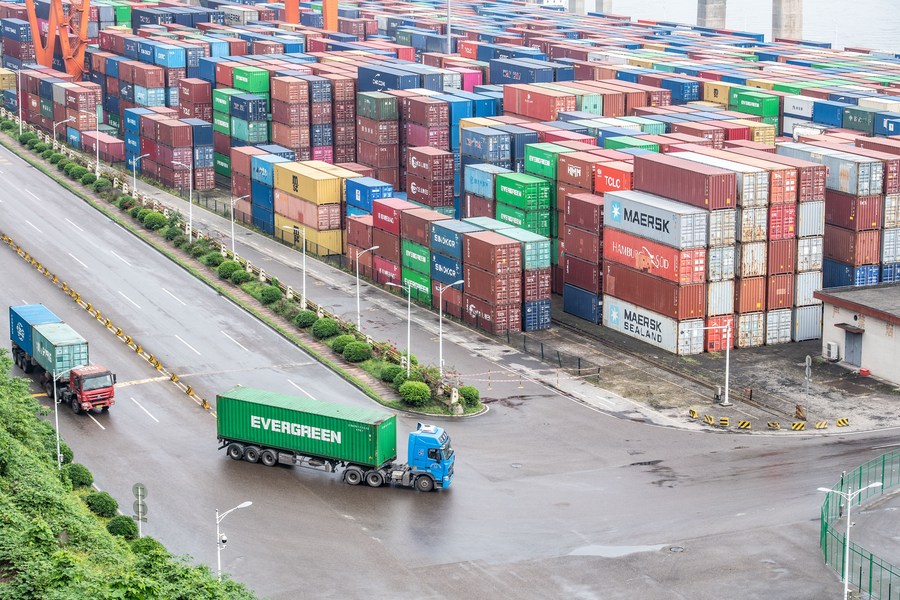Despite Rising Geopolitical Tensions, China’s Economy Stands Resilient

China can withstand the turbulent times in the near future by embracing closer ties with BRICS member states, making the BRI a terrific success story and boosting domestic consumption that can deliver outstanding win-win results for China and the global economy at large.
China’s GDP (gross domestic product) rose by 5.5 percent during the first half of 2023 over a year ago, according to the National Bureau of Statistics (NBS). The national economy expanded 6.3 percent in the second quarter, compared to the same period last year, while the first quarter of 2023 had a 4.5 percent growth rate. China had gained momentum for a remarkable rebound starting in late January when most of the Beijing’s Covid pandemic measures were scrapped and by February, it was already business as usual in the country.
For three years prior, the Chinese government had implemented rigorous public health and safety protocols to lower mortality rates while the Coronavirus was infecting and killing multitudes of people worldwide. Fortunately, China’s actions had saved countless lives in the country, but the pandemic’s impact on the national economy were serious. Accordingly, its economic rebound this year has emerged as an amazing sight to behold.
Nonetheless, the naysayers and anti-China doomsayers were still rushing to judgement and pointing out that the news agency Reuters had conducted a poll of analysts and issued a report forecasting that China would hit a 7.3 percent growth target for the second quarter.
Yet, the Chinese economy keeps roaring ahead and its failure to strike the ambitious 7.3 percent GDP growth rate was largely on account of a deep recession spreading across Europe and the U.S. only capturing 1.1 percent economic growth for the first half of the year. The dramatic drop in Western consumption and demand has resulted in lower trade figures for China but Westerners should not be celebrating this.
Lower consumption among wealthy Western nations signals stormy seas on the horizon
China has emerged as the world’s largest trading nation due to its robust manufacturing sector and exports. The global supply chains are tightly linked to Chinese industrial enterprises and breaking that apart can’t be achieved. Many American politicians are calling for a decoupling from the Chinese economy, however they don’t recognize the enormous risks and consequences that would ensue from such misguided actions.

Amid the slowdown of the economies in Europe and North America, the right move for those nations would be to embrace a stronger integration with the global markets and that should include China. But many Western elites and government officials have gotten blinded by anti-China hysteria and they would prefer sabotaging the international economy in order to harm Beijing.
Hence, mainstream media outlets in the West pay little attention to the lower consumption and demand in the U.S. and prefer to highlight China’s sudden drop in international trade. According to CNN, China’s exports had plunged by 12.4 percent in June alone and the country’s imports dropped 6.8 percent, compared to the same month of 2022.
Yes, the trade figures do show cause for cause for concern but the Chinese government will become more emboldened to pursue new policies to boost domestic consumption and to shift in favor of more preferential trade treatments with non-Western aligned nations, such as with the countries in Southeast Asia, the Middle East, Latin-America, and Africa.
U.S. and Europe are no longer reliable consumers for global traders and manufacturers
China boosting domestic consumption will inevitably lead to higher imports in its long-term outlook. The prosperity of the U.S. economy comes with a strong U.S. dollar, robust services sector and Americans are the largest buyers of foreign-made goods. Although on paper, U.S. trade deficits with many other nations, especially with Asian countries, look bleak, there are still major benefits for Washington.
The U.S. can maintain an influential role on the world stage and over its foreign policy agenda as a giant purchaser of imports. Washington can force many other nations to comply with their diplomatic demands by threatening to raise tariffs or block trade with weaker nations that are much more reliant on their exports and manufacturing sectors.
The Chinese government does not want to get entrapped by Washington’s scheming and has devoted more efforts to boost its domestic economy. Nevertheless, China’s transformation to spur domestic consumption and to focus more on other foreign markets for its exports will take many years to achieve maximum momentum.

But Beijing has taken the right steps. The Belt and Road Initiative (BRI) is helping many developing nations in Asia, Africa and elsewhere to build big infrastructure projects that will jumpstart their development and economies.
And when new roads, bridges, and international ports get constructed in the regions of the Emerging Markets, the smaller countries can enter prosperous modes of development – industrialization, urbanization and modernization. China’s trade figures with the BRI member states will see remarkable growth patterns as well.
China will continue to boost domestic industrial output. In June, 2023, the country’s combined total of manufacturing, mining and utilities had risen to 4.4 percent, year-on-year. Therefore, the big drop in global demand for Chinese imports had created more incentive for Beijing to boost domestic consumption and China’s retail sales rose by 3.1 percent in June as well.
China remains poised for robust economic growth for the second half of the year
The Western economies could head for a significant downturn soon, but China could avoid a similar scenario. The U.S. is pushing forward on the China containment strategy and that would compel the European nations to make tough decisions. If EU member states do support Washington’s efforts that will result in worse trade relations with China and the recession on their continent will get much worse for them.
Additionally, U.S. technology companies that have long enjoyed having lucrative business ties with Chinese investors and companies but they will get hit hard by Washington’s tougher trade protectionists’ measures imposed on Beijing.
Consequently, Chinese consumers will play a much larger role in the national economy. Meanwhile, we should anticipate that Beijing’s trade and diplomatic ties to ASEAN (Association of South East Asian Nations) could grow much firmer in the long run.
China is the largest trading partner to the ASEAN regional bloc. Therefore, China can withstand the turbulent times in the near future by embracing closer ties with BRICS (Brazil, Russia, India, China and South America) member states, making the BRI a terrific success story and boosting domestic consumption that can deliver outstanding win-win results for China and the global economy at large.
The article reflects the author’s opinions, and not necessarily the views of China Focus.
 Facebook
Facebook
 Twitter
Twitter
 Linkedin
Linkedin
 Google +
Google +



